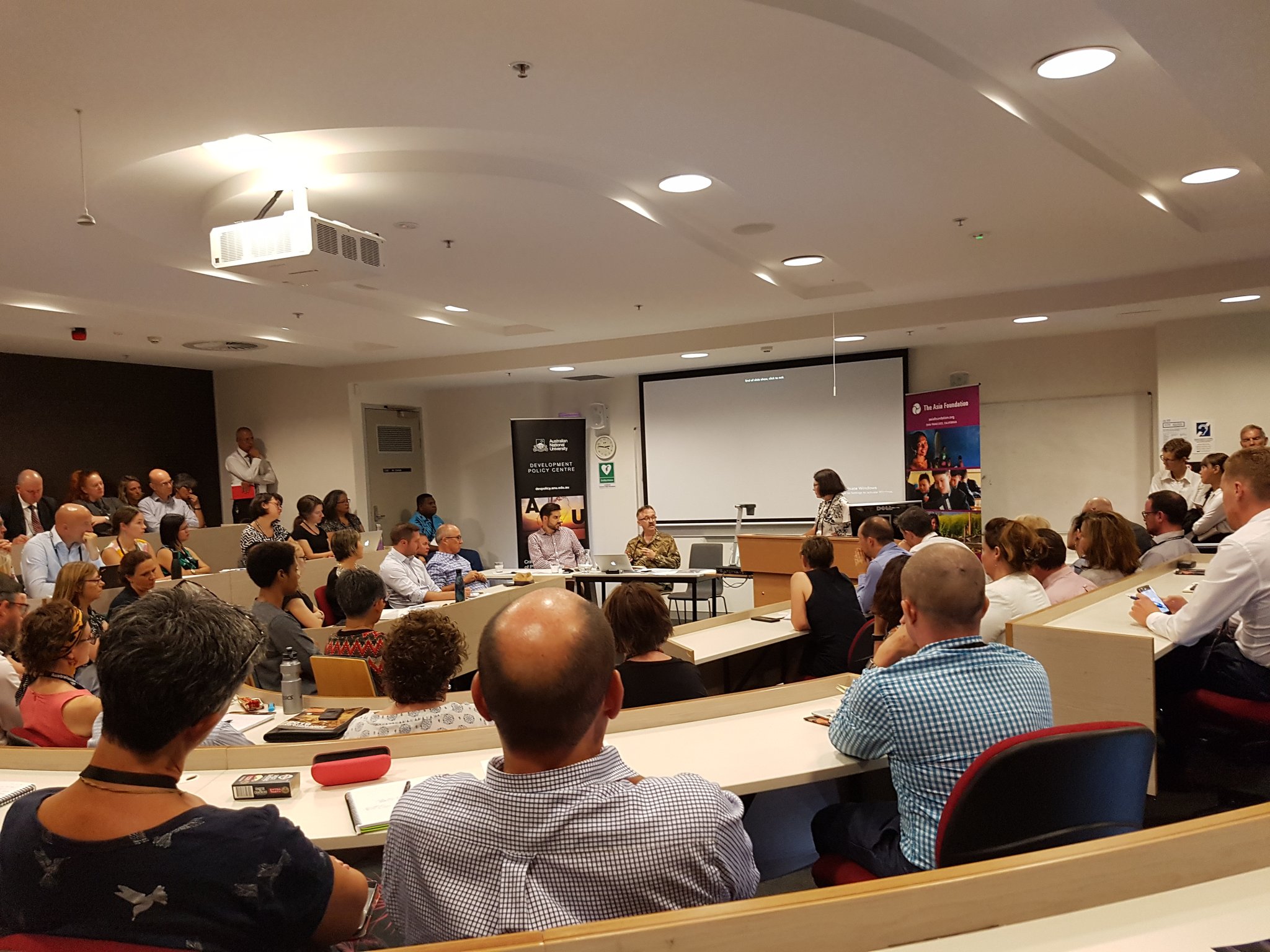
The integration review launch @AAC2019. (Credit: Zoe Mander-Jones/Twitter)
The DFAT-AusAID integration review @AAC2019
By Richard Moore
6 March 2019
The Development Policy Centre’s 2019 Australasian Aid Conference could be a watershed in Australia’s approach to regional development, but only if all parties push on to make it so.
There was a striking congruence between the Secretary’s impressive speech opening the conference, ACFID CEO, Marc Purcell’s closing remarks, and the conclusions emerging from my own review of the first phase of the DFAT-AusAID integration.
In each case, a vision was put forward of a high-performing development program that serves Australia’s national interests by delivering the greatest value and the most poverty reduction for our Asian and Pacific partners. There was recognition this requires deep expertise, new relationship models and ongoing reshaping of economic, security and development policy and programs.
It is particularly striking that all of us argued that it is time to retire aid language and relationships – at least as the default descriptor of what we do. When I advanced this proposition at the same conference three years ago, David Hudson took a poll in a subsequent session that found very low support for the idea. The world really has changed since then.
But perhaps even more important is the amount of attention that the Secretary gave the issue of expertise and broader capability. This was identified as DFAT’s Achilles heel in the integration study, notwithstanding the improved ratings that have emerged from the 2018 Australian Aid Stakeholder Survey.
At this point we hit a significant conundrum. The Secretary’s vision is one I think a large proportion of the development community can buy into and actively support. And while her views have evolved, they have also been fairly consistent over the last couple of years, reflecting, I think, genuinely held convictions. However, the integration review concludes that they are not yet consistently expressed in departmental policy, processes and practices. This explains why we are not at the point of realising the vision, nor are we likely to do so without substantial changes.
Take the Secretary’s most succinct expression of where she sees development fitting into our foreign policy: “I strongly believe that Australia’s national interest is best served through a well-resourced and effective, highly professional development assistance program that delivers on our long term interests in our partners’ prosperity”. (Watch the livestream replay of her speech here.)
Our more farsighted diplomats have a similar view, but it is a long way from universal. In a major program a senior officer has characterised the role of the program as to provide “small treats often”. Elsewhere this becomes “small tweets often”, with too heavy a weighting on public diplomacy.
If we want to pursue long-term, strategic goals that simultaneously strengthen our own security, stability and prosperity by relentlessly focusing on advancing that of our neighbours this needs to be unambiguously articulated as departmental policy. We do not have that clear statement of strategic intent, which is why I recommend that we start by providing it.
But my call is for strategy as a process, not just a document. A systematic approach is needed to translate the purpose and aims of our international development efforts into clear policies, programs, investments and behaviours that deliver it. It is needed to define the capabilities required and to align resourcing and performance processes to drive its achievement.
Historically, DFAT was not a program department. This may explain why it lacks the deeply-embedded mechanisms and culture to systematically move from strategy and planning through policy to budget and performance. This explains tremendous variability post-integration, with policy gains in areas such as Pacific labour and private sector collaboration and the relatively recent, but very welcome emergence of much sharper strategic approaches from the Indo-Pacific group.
However, this progress – largely unlocked by a sense of crisis – coincides with widespread examples of delegated and diminished policy dialogue; reduced capacity to influence and coordinate partners; and growing difficulties designing and managing the sorts of activities most likely to deliver the results we want. This is not yet fully recognised, nor adequately addressed.
The integration review puts forward a five-point plan with 18 recommendations designed to: 1) deliver strategic clarity; 2) organise around relationships; 3) build capability; 4) re-engineer decision making for strategic outcomes; and 5) strengthen and better use the performance system. Key aspects include regrouping development policy expertise in a Directorate for International Development and creating a separate, but tightly-linked, DFAT Technical Support Organisation to undertake design, source delivery capability and conduct technical monitoring and advisory functions.
The plan has a price tag that requires a new budget bid to put our diplomacy and development work on a much surer financial footing. This is especially important given a substantial transfer of resources from the development program to the broader department. Notwithstanding this, neither is adequately resourced for the future.
The five-point plan is merely one roadmap, not the only possible one, nor necessarily the best. But it is, I think, coherent and it does seek to address the biggest problems we confront. My hope is that with the door momentarily ajar, others will put forward better ideas to move us forward.
In commenting on the review the Secretary ‘took issue’ with what she argued was my inaccurate contrasting of Australian diplomacy as inherently short-term and development cooperation as long-term. This is indeed a subject we might debate further, though my proposition was more that short-term drivers tend to predominate, rather than that this is inevitable.
I will be particularly pleased if the department disproves my contention in the way it responds to shared regional development challenges in the second phase of integration. We must now organise to promote that outcome.
Read the full integration review here.
About the author/s
Richard Moore
Richard Moore is a Manila-based international relations consultant and Strategic Advisor at the Development Intelligence Lab. He is founding Co-convenor at the Asia-Pacific Development, Diplomacy & Defence Dialogue (AP4D).
